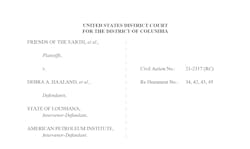Court blocks latest GoM offshore lease sale, wants more greenhouse gas calculations
A federal court Jan. 27 invalidated the latest Gulf of Mexico offshore oil and gas lease sale, the judge ruling that the administration must run additional calculations on the leasing plan’s potential contributions to global greenhouse gas emissions.
More specifically, the court ruled that the Interior Department’s Bureau of Ocean Energy Management (BOEM) failed to include a calculation of potential impacts on global fossil fuel consumption if the lease sale were not held at all.
The ruling does not mean the lease sale will not be held again at a later date, but for now Lease Sale 257 is vacated and remanded to BOEM for the calculations sought by the environmental advocacy plaintiffs.
The case is Friends of the Earth v. Haaland in the US District Court for the District of Columbia. Lead plaintiff Friends of the Earth was joined by Sierra Club, Center for Biological Diversity, and Healthy Gulf. Interior Secretary Deb Haaland was the lead defendant.
The lease sale was held Nov. 17, but the leases have not yet been awarded (OGJ Online, Nov. 17, 2021).
NEPA complications
As in many environmental lawsuits against government permits for oil and gas activity, the plaintiffs brought suit under the National Environmental Policy Act (NEPA), a procedural law requiring analyses of environmental impacts and alternatives. The law includes a requirement for considering a “no action alternative,” and the court ruling hinged on the question of global emissions if no action—meaning no leasing—were taken.
The government argued in defense that realistic calculations of a change in global emissions could not be made for such a “no action alternative,” but Judge Rudolph Contreras disagreed.
The judge cited the emission calculation methodology of the Stockholm Environmental Institute, submitted by the environmental plaintiffs. The Stockholm Environmental Institute describes itself as working “to shift global policy and practice towards sustainability” and tries to offer strategies to shift societies away from dependence on fossil fuels.
The government defendants criticized the usefulness of the Stockholm studies on several grounds, but the judge chose not to give any legal weight to those objections.
It was not a decision that sat well with everyone following the case.
“American investment, jobs, and infrastructure development continue to suffer because of the continued expansion of the bounds of the National Environmental Policy Act by the judiciary,” said Erik Milito, president of the National Ocean Industries Association, in a statement issued after the ruling.
Policy change wanted
Rep. Raul Grijalva, chairman of the House Natural Resources Committee, greeted the ruling as “a welcome chance to reset our federal fossil fuel leasing policies.”
The court did not suggest a leasing policy change, only a new calculation for a specific lease sale. But Grijalva may have been looking forward to the writing of the next 5-year plan for offshore oil and gas leasing under the Outer Continental Shelf Lands Act.
The American Petroleum Institute also focused on policy in its response to the case.
“This ruling is yet another example of the increasing policy and legal uncertainty that is jeopardizing the future of American energy leadership and leading to greater dependence on foreign energy sources that result in higher emissions,” said Frank Macchiarola, the trade group’s senior vice-president of policy, economics, and regulatory affairs.
About the Author
Alan Kovski
Washington Correspondent
Alan Kovski worked as OGJ's Washington Correspondent from 2019 through 2023.
